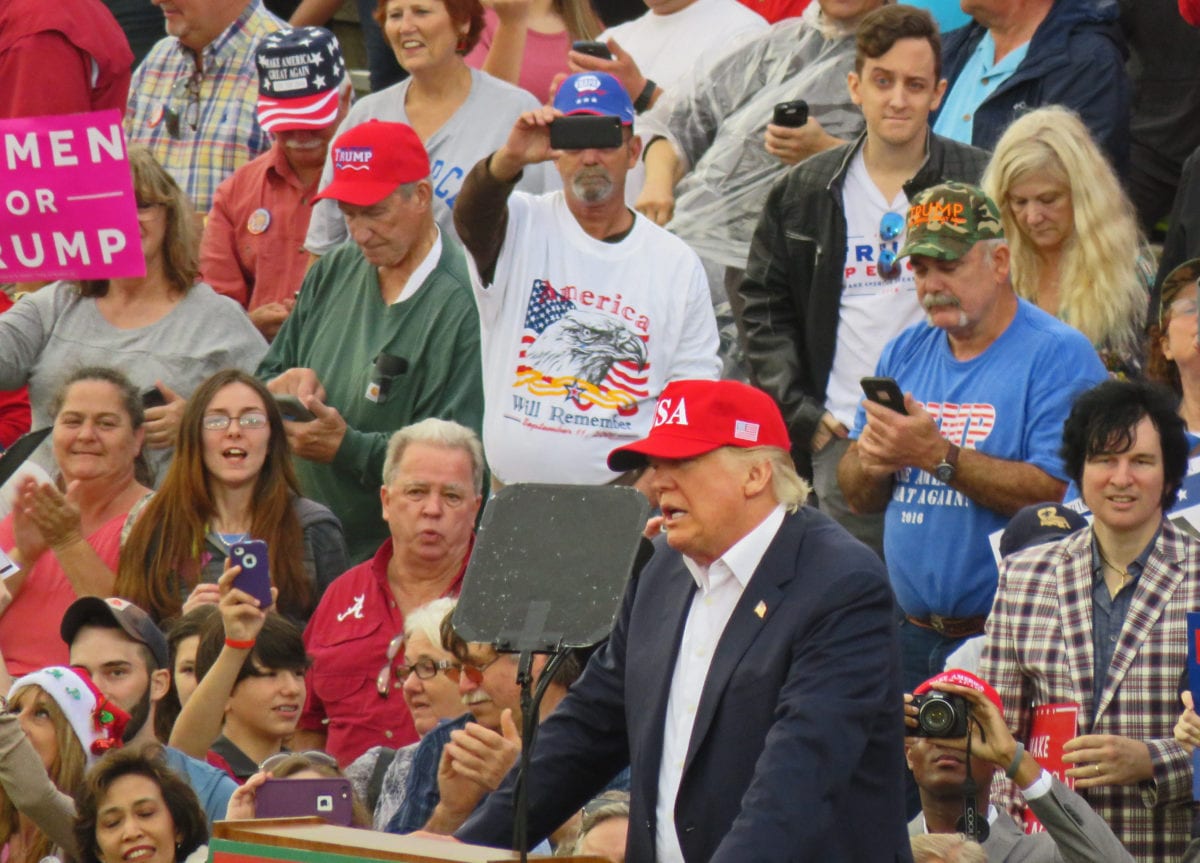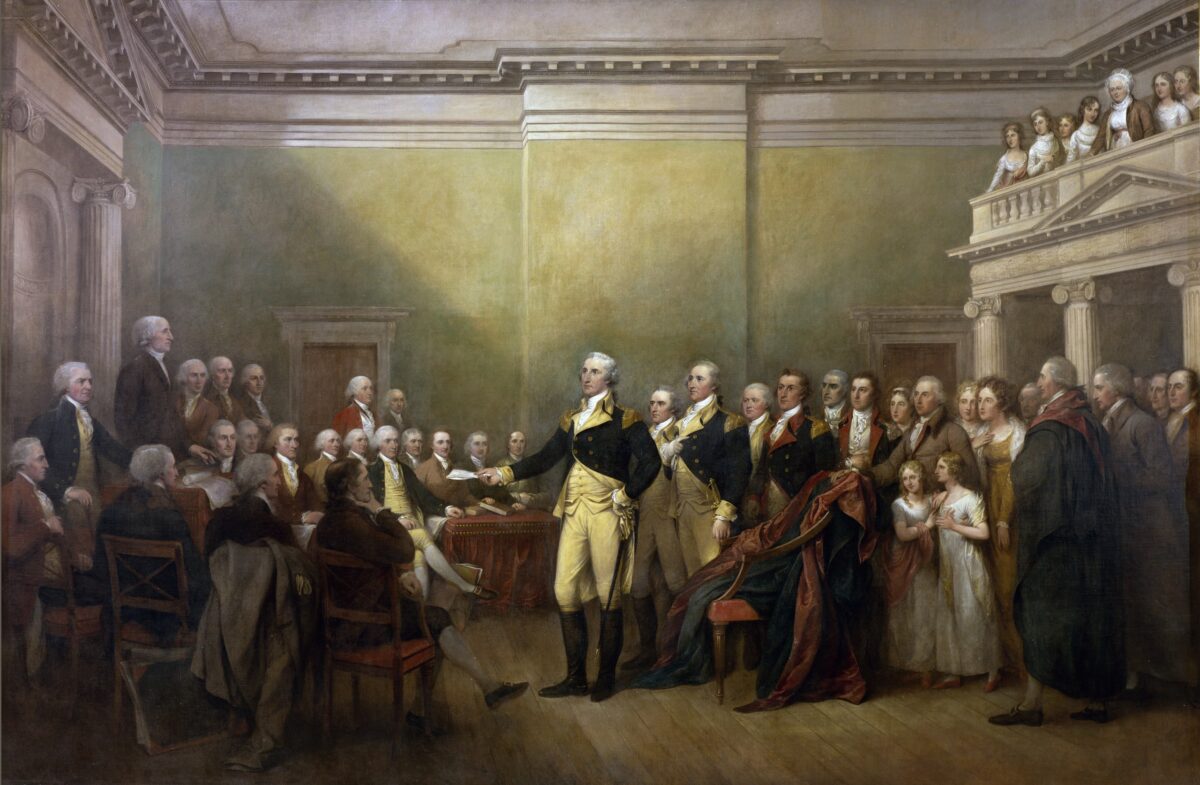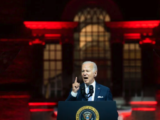
President-elect Donald J. Trump returns to Mobile, Alabama, in last stop on ‘victory tour.’: Glynn Wilson
The Big Picture -Â
By Glynn Wilson -Â
WASHINGTON, D.C. — No one is above the law.
That includes the President of the United States.
Whether you can convict one is another question.
But at least America is not a Catholic monarchy, although the Supreme Court looks like one with six out of nine justices practicing Catholics.
The Declaration of Independence in 1776 and the U.S. Constitution ratified in 1788 established this unique country 235 years ago, on land only discovered by old world explorers about 500 years ago, as a government of the people, not a government of the pope and a king.
In monarchies such as the United Kingdom, formerly known as England or Great Britain, common law precedent carried a legal doctrine known as Sovereign Immunity, sometimes called crown immunity. Under this undemocratic legal principle, it is argued that a state (or national government) cannot commit a legal wrong and is immune from civil lawsuits or criminal prosecutions. That would include a pope, a king or a queen.
If we are not careful, the president of the United States could become immune to prosecution, like a monarch.
While this doctrine is considered anathema in U.S. law, versions of it have crept into state laws, such as Alabama. In that case, William Powell, an attorney for a friend-of-the-court group, said sovereign immunity is a powerful legal-protection device now being used by corporations in conjunction with certain states.
“You can only sue the king if the king lets you,†he said.
For more than 200 years of American history, after George Washington famously resigned his commission as commander-in-chief of the Continental Army and turned over power to the Continental Congress at the end of the Revolutionary War, returning to civilian life at Mount Vernon, the United States has been known as a democratic republic.

General George Washington Resigning His Commission: depicts George Washington’s resignation as commander-in-chief of the Army to the Congress, which was then meeting at the Maryland State House in Annapolis, on December 23, 1783. This action was of great significance in establishing civilian, rather than military rule, leading to a republic, rather than a dictatorship. Washington stands with two aides-de-camp addressing the president of the Congress, Thomas Mifflin, and others, such as Elbridge Gerry, Thomas Jefferson, James Monroe, and James Madison. Mrs. Washington and her three grandchildren are shown watching from the gallery, although they were not in fact present at the event. John Trumbull (1756–1843) was born in Connecticut, the son of the governor. After graduating from Harvard University, he served in the Continental Army under General Washington. He studied painting with Benjamin West in London and focused on history painting. This oil painting on canvas is now located in the United States Capitol rotunda in Washington D.C.
By now most people know the famous true story of what Dr. Benjamin Franklin said at the close of the Constitutional Convention in 1787 as he left Independence Hall on the final day of the deliberations of the Continental Congress to head over to City Tavern for a cool ale.
“Well, Doctor, what have we got?†a woman asked. “A Republic or a Monarchy?â€
“A Republic,†Franklin replied. “If you can keep it.â€
Governments of the people around the world have sometimes been hard to keep, falling to authoritarian dictators from time to time. Trump is the closest we have ever come, and the battle to prevent it is not over yet. If Trump somehow survives all the legal charges against him and lives to run for president again in 2024, democracy will be on the line again.
On Tuesday, as Trump is escorted by the Secret Service to the Manhattan Criminal Courts Building, I will be riding Skyline Drive in Shenandoah National Park in Virginia. But I will be back on the computer in the afternoon to follow and cover the first indictment of a former U.S. president on criminal charges. It is about time.
While news organizations are still reporting on Monday that the exact charges against Trump are not yet known, people with knowledge of the matter said that there are more than two dozen counts in the indictment, according to The New York Times.
The charges are expected to be related to a hush-money payment Trump and his fixer-lawyer Michael Cohen made to adult porn star Stormy Daniels in October 2016, during the final weeks of the presidential campaign. She was reportedly trying to sell her story about a sexual affair with Trump to the National Enquirer. David Pecker, the tabloid’s publisher and a longtime ally of Trump, had agreed to look out for potentially damaging stories about him during the 2016 campaign, and at one point even agreed to buy the story of another woman’s affair with Trump and never publish it, a practice known as “catch and kill.â€
Pecker didn’t purchase Daniels’s story. He and the tabloid’s top editor, Dylan Howard, helped broker a separate deal between Cohen and Daniels’s lawyer. Cohen, who has already pleaded guilty and served time for crimes related to this payment, admitted paying Daniels $130,000, for which he was later reimbursed by Trump after he was serving in the White House in 2017.
Cohen pleaded guilty to a number of charges in 2018, including federal campaign finance violations, since the payment amounted to an improper donation to Trump’s campaign, federal prosecutors argued.
In the days after Cohen’s guilty plea, the district attorney’s office opened its own criminal investigation centering on Trump.
After Trump is arraigned, he is almost certain to be released on his own recognizance, according to the Times, since the indictment is likely to contain only nonviolent felony charges. Under New York law, prosecutors can’t request that a defendant be held on bail in such cases.
The prosecutors in Cohen’s case raised questions about Trump’s monthly reimbursement checks to Cohen, saying in court papers that Trump’s company “falsely accounted†for the monthly payments as legal expenses and that company records cited a retainer agreement with Cohen. Although Cohen was a lawyer, and became Trump’s personal attorney after he took office, there was no such retainer agreement, and the reimbursement was unrelated to any legal services Cohen performed.
Cohen has said that Trump knew about the phony retainer agreement, an accusation that could form the basis of the case against the former president.
In New York, falsifying business records can amount to a crime, usually a misdemeanor. To elevate the crime to a felony charge, DA Alvin Bragg’s prosecutors must show that Trump’s “intent to defraud†included an intent to commit or conceal a second crime, a violation of election law. While hush money is not automatically illegal, the prosecutors could argue that the $130,000 payout effectively became an improper donation to Trump’s campaign, under the theory that it benefited his candidacy because it silenced Daniels and prevented the American public from finding out about it before the election. Trump denied it all along, and many of his followers believed him.
Convicting Trump or sending him to prison could be challenging. Trump’s lawyers are sure to attack Cohen’s credibility by citing his criminal record, although prosecutors would counter that the former fixer lied years ago on behalf of his boss at the time and is now in the best position to detail Trump’s conduct.
The case against Trump could hinge on an untested legal theory. New York prosecutors have never before combined the falsifying business records charge with a violation of state election law in a case involving a presidential election, or any federal campaign. Because this is uncharted territory, it is possible that a judge could throw it out or reduce the felony charge to a misdemeanor.
Even if the charge is allowed to stand, it amounts to a low-level felony. If Trump were ultimately convicted, he would face a maximum sentence of four years in state prison, though prison time would not be mandatory.
But any conviction would still establish an important precedent that would back up this often cited principle of American law, that no one is above the law, including the President of the United States.
If the case fails for some reason, and Trump is somehow exonerated, it could be a blow to that principle.
Much is on the line in this case, although there is still a case of election tampering in Georgia on the line, as well as obstruction of justice potentially in the case against Trump for not cooperating with the FBI in turning over classified documents found at his Mar-a-Lago beach house. Then there is the most important case of all, charges by a Department of Justice special prosecutor for seditious conspiracy to incite an insurrection on Jan. 6, 2021, to halt the peaceful transfer of power and overturn the certification of an honest election for president in 2020.
If all the charges fail, and Trump is able to win reelection in 2024, god help American democracy.
Not to mention human life on planet Earth. It might take a god to save us then, or aid from some alien species watching from some exoplanet out there in the vast and expanding universe.
___
If you support truth in reporting with no paywall, and fearless writing with no popup ads or sponsored content, consider making a contribution today with GoFundMe or Patreon or PayPal.














If Trump were of another party, we would not be having this immunity nonsense discussion. Additionally those advocating violence as a form of “free speech” wouldn’t be happening either…